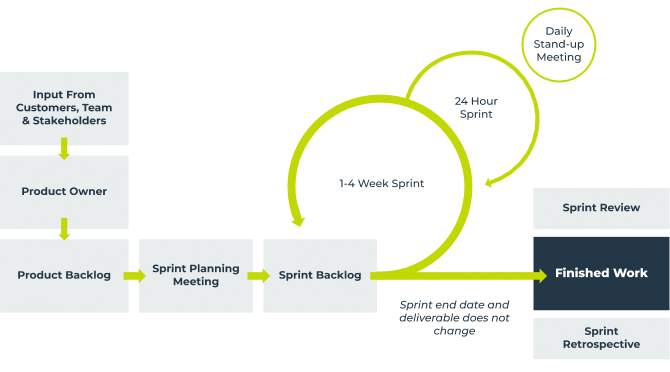Updated on: 3/26/2025
Key Takeaways
- Project Management Foundation: Project management is important for software development success, providing clear vision, guidance, and structure through methodologies like Agile that favor iterative development and customer collaboration over rigid documentation.
- Process and Risk Management: Effective software project management involves careful planning, resource allocation, and risk management through incremental steps, reducing unexpected costs and ensuring quality through standardized methodologies and continuous monitoring.
- Collaboration and Communication: Success depends on strong collaboration and clear communication between stakeholders, with proper tools and frameworks in place to overcome common challenges like miscommunication and poor planning, while maintaining quality throughout the development lifecycle.
Software development projects tend to be complex and multi-faceted. To complete a project on time and in budget, software developers must engage in efficient planning, organization and monitoring. Project management involves the use of various policies, procedures and principles to plan, implement and complete a project. To ensure a satisfactory result, projects must begin with specified parameters designed to produce the desired outcome. Every project that goes through the project management process follows a project life cycle that essentially guides the project from start to completion.
Why Project Management Is Important For Software Development
 Software project management focuses on developing a product that will have a positive effect on an organization. Without project management, a software development team may begin working on a project without any clear vision or guidance, resulting in more frequent errors and confusion.
Software project management focuses on developing a product that will have a positive effect on an organization. Without project management, a software development team may begin working on a project without any clear vision or guidance, resulting in more frequent errors and confusion.
Part of software project management involves making everyone involved aware of the purpose of the project and what steps are required to meet the end goal. Learn more about project management for software development and what it entails.
Benefits Of The Agile Methodology For Software Development
Agile software development is an umbrella term for a set of practices and methodologies based on iterative development. Also referred to as simply Agile, this form of project management for software development focuses on the clean delivery of each individual part of the software rather than the software as a whole. By using Agile, software development teams can reduce costs, lessen stress on development teams, and improve turnaround times.
Agile software development is inspired by the Agile Manifesto which has principles that favor people and interactions over tools and processes. It also promotes customer collaboration and the use of working software over comprehensive documents.
Reducing Risks & Unexpected Costs Through Incremental Steps
During the software development process, things can change quickly. It is important for team members to know what risks they face and how to best handle these risks. The iterative and incremental approach to software project management involves handling changes and reducing inherent risks to avoid major business interruptions and unexpected costs.
This methodology is an excellent choice for large-scale companies that work on multiple projects at one time that present a high degree of risk. There are several software project management approaches, such as Agile project management, that have evolved from the incremental and iterative approaches.
Measuring Product Quality
Using a standardized methodology, businesses are able to define project quality to ensure that the product delivered meets customer expectations. Quality is an important component of software development but measuring product quality is not always easy. Project quality relies on identifying target customers and their unique requirements.
Quality assurance and quality control are often used interchangeably but have different meanings. While quality assurance focuses on preventing defects before they occur, quality control focuses on identifying and correcting defects after production. Software project management aims to discover defects before implantation to achieve a higher rate of customer satisfaction.

The Standard Software Development Cycle and Project Management’s Impact
 Within the software development lifecycle, project management plays a pivotal role in orchestrating the design, development, testing, deployment, and maintenance phases of software creation. Effective project management is indispensable for ensuring projects are completed within designated timelines, budget constraints, and to the satisfaction of stakeholders.
Within the software development lifecycle, project management plays a pivotal role in orchestrating the design, development, testing, deployment, and maintenance phases of software creation. Effective project management is indispensable for ensuring projects are completed within designated timelines, budget constraints, and to the satisfaction of stakeholders.
Planning and Organizing
At the onset of the software development lifecycle, meticulous planning and organization lay the groundwork for project success. Project managers collaborate closely with stakeholders to delineate the project’s scope, objectives, and milestones. Through comprehensive requirement gathering, they ascertain the necessary resources and craft a detailed project plan that delineates tasks, resource allocations, and timelines. Project managers endeavor to ensure the feasibility and alignment of the project plan with organizational objectives while garnering stakeholder consensus to forge ahead.
Resource Allocation
With the blueprint in hand, project managers undertake the pivotal task of resource allocation. This entails judiciously assigning developers, testers, and other team members to specific tasks while equipping them with requisite tools and support. Striking a delicate balance between quality, cost, and time imperatives, project managers navigate resource allocations to uphold project integrity, timely delivery, and adherence to quality standards.
Monitoring Progress
Project managers assume a role in monitoring the progress of software development endeavors to ensure adherence to schedules and milestones. Leveraging tools like Gantt charts, Kanban boards, and project management software, they meticulously track tasks, deadlines, and milestones. Regular communication with team members facilitates comprehensive progress updates, enabling early identification of issues and risks. Proactive intervention at this stage prevents minor setbacks from escalating into major impediments, thereby safeguarding project momentum and trajectory.
Risk Management
In this stage, project managers are tasked with identifying and mitigating potential risks that could jeopardize project outcomes. Through comprehensive risk assessments, they proactively identify vulnerabilities and devise robust mitigation strategies. These strategies may entail contingency planning, establishing backup systems, or instituting protocols for addressing unforeseen events. By adopting a proactive approach to risk management, project managers fortify project resilience and bolster the likelihood of successful project outcomes.
Stakeholder Management
Project managers serve as conduits between project teams and stakeholders, ensuring transparent communication, addressing concerns, and aligning project deliverables with stakeholder expectations. By fostering collaborative partnerships and nurturing open dialogue, project managers cultivate a conducive environment for stakeholder engagement, thereby enhancing project credibility and stakeholder satisfaction.
The Orases Software Project Management Process
Based in Frederick County, Maryland, Orases offers custom software application development solutions that help businesses reach their vision. The Orases software project management process involves a series of steps designed to enable teams to feel powerful and reduce risks during projects to reach a minimum viable product. The Orases approach includes the following:
- Alignment — Orases pairs a reliable and proven software process with certain mythology to deliver efficient IT projects.
- Iterative & Incremental — Through software project management, businesses can improve the quality of their project and reduce costs while maintaining a prominent place in the market.
- Quality-driven — Businesses can achieve a competitive advantage through efficient processes, accurate testing and greater control over projects.
- Scalable — The experienced developers at Orases will help build and secure an adaptable infrastructure to allow businesses to grow and remain compatible.
- Collaborative — Orases works remotely with businesses to create a collaborative team that allows organizations to give feedback and play a critical role in the software development process.
Collaborative Challenges Of Project Management For Software Development In The Industry
 Project collaboration occurs when two or more people work together to achieve a common goal. However, collaboration during the software development process may cause certain challenges. One of the most common challenges faced by developers is poor communication. Miscommunication and misunderstandings can result in conflicts and mistakes; some development teams also experience poor planning. When there is not a solid plan in place, roles and responsibilities can overlap resulting in wasted time and money.
Project collaboration occurs when two or more people work together to achieve a common goal. However, collaboration during the software development process may cause certain challenges. One of the most common challenges faced by developers is poor communication. Miscommunication and misunderstandings can result in conflicts and mistakes; some development teams also experience poor planning. When there is not a solid plan in place, roles and responsibilities can overlap resulting in wasted time and money.
Finally, software development teams can experience challenges in relation to the tools used for collaboration. The right communication tools can help team members work together in the most efficient way possible.
Contact An Experienced Custom Software Development Company
Software development teams often rely on project management to stay on track and avoid hurdles that could disrupt the development process. To learn more about software project management for custom software development, reach out to the software experts at Orases today by calling 301.756.5527 or by requesting a consultation below.
"*" indicates required fields







